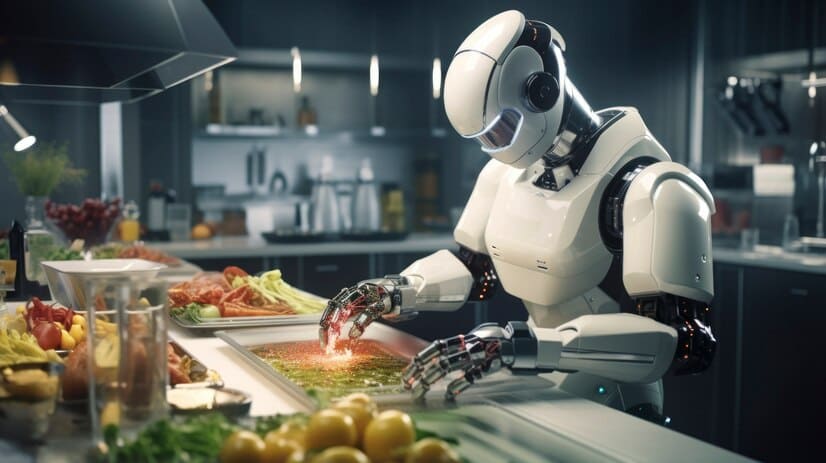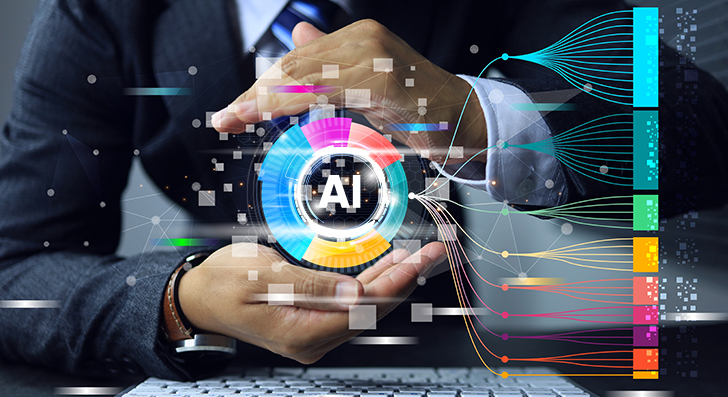AI is rapidly transforming how we get groceries. Forget struggling with overflowing carts and long checkout lines. AI personalizes your shopping experience, recommending items you need and optimizing delivery routes for speed. Imagine groceries arriving in under 30 minutes, thanks to strategically placed micro-fulfillment centers powered by AI. This technology also tackles food waste by predicting demand and streamlining inventory management. With AI, grocery deliveries are becoming faster, smarter, and more convenient, revolutionizing the way we put food on the table.
The Algorithmic Kitchen: How AI is Shaping Our Grocery Choices and Diets
Our kitchens are no longer just about pots and pans – they're becoming data centers disguised as culinary havens. Artificial intelligence (AI) is infiltrating our grocery lists and subtly influencing what we eat. Let's explore how AI is shaping our food choices and diets:
Personalized Grocery Planning:
Gone are the days of endless meal planning and forgotten staples. AI algorithms analyze your past purchases, browsing history, and even health data (with your permission) to suggest groceries you might need. This eliminates the stress of remembering essentials and ensures a well-stocked kitchen. However, a question arises: is AI promoting healthy choices or simply suggesting what you usually buy?
AI-powered Nutrition Management:
For those with specific dietary needs, AI offers a helping hand. Grocery platforms can recommend suitable options for diabetics, gluten-free individuals, or those with allergies. This streamlines the shopping experience, eliminating frustration and saving valuable time. AI can even:
Craft recipes based on your pantry: No more staring blankly at a fridge full of ingredients. AI can suggest delicious meals using what you already have, encouraging culinary creativity.
Develop personalized meal plans: By analyzing your health goals and dietary needs, AI can create a customized meal plan for the week, complete with a grocery list tailored to your specific requirements.
The Algorithmic Kitchen: A Double-Edged Sword?
While AI offers undeniable convenience, ethical considerations linger:
Data Privacy: Who owns your grocery data and how is it used? Transparency and user control over data collection are paramount.
Algorithmic Bias: AI algorithms can perpetuate historical biases present in their data. Ensuring fair and inclusive recommendations for all users is crucial.
From Farm to Fridge: Optimizing the Grocery Supply Chain with AI:
The journey from farm-fresh produce to your refrigerator door is undergoing a revolution powered by artificial intelligence (AI). Let's explore how AI is streamlining and optimizing the entire grocery supply chain, leading to increased efficiency, reduced waste, and a more sustainable food system.
Demand Forecasting: AI algorithms analyze historical sales data, weather patterns, and even social media trends to predict demand for specific products. This allows farms to optimize planting and harvesting, and grocery stores to maintain optimal inventory levels, minimizing the risk of stockouts or spoilage.
Smart Warehousing: AI-powered warehouse management systems track inventory in real-time, optimizing storage conditions and automating order picking processes. This reduces waste due to mishandling and ensures efficient delivery to stores.
Ultrafast Deliveries: Strategically placed micro-fulfillment centers, powered by AI, are revolutionizing grocery deliveries. AI optimizes delivery routes, manages order picking within the micro-centers, and enables ultrafast deliveries, getting groceries to your fridge in under 30 minutes.
Reduced Food Waste: By accurately predicting demand, AI helps prevent overstocking and spoilage at all stages of the supply chain. This translates to less food waste, a major environmental concern.
Optimized Logistics: AI algorithms can plan delivery routes that minimize fuel consumption and emissions. This not only reduces costs but also contributes to a more sustainable food system.
Local and Sustainable Sourcing: AI can analyze data to identify local and sustainable producers, enabling grocery stores to source fresh, high-quality products while supporting local communities.
AI and the Future of Grocery Jobs: A Transformation, Not a Replacement:
Repetitive Tasks on Autopilot: Imagine AI-powered robots handling stock management and order picking in warehouses. This frees up human workers for more valuable tasks.
Smarter Checkout Systems: Self-checkout lanes powered by AI will become more sophisticated, reducing checkout times and allowing cashiers to focus on customer service.
Data-Driven Decision Making: AI can analyze sales data and customer preferences to optimize store layouts and product placement. This requires human expertise to interpret the data and make strategic decisions.
AI System Maintenance: As AI becomes more integrated into grocery operations, new roles will emerge for maintaining and troubleshooting these systems.
Data Analysts: The ability to analyze and interpret data from AI systems will be crucial for optimizing inventory management, marketing strategies, and overall store operations.
AI User Experience Specialists: Ensuring a seamless and user-friendly experience with AI-powered features like self-checkout or personalized recommendations will require skilled user experience professionals.
The transition to an AI-powered grocery landscape requires investment in upskilling and reskilling existing workers. This could involve training programs in data analysis, AI system maintenance, or customer service skills tailored to working alongside AI.
Personalized Customer Service: Building rapport with customers, offering product recommendations, and providing assistance with complex purchases will remain the domain of skilled customer service personnel.
Curating the Shopping Experience: AI can suggest products, but human expertise is essential when it comes to creating a visually appealing and well-stocked store environment that entices customers.
Problem-Solving and Adaptability: Unexpected situations inevitably arise. Human intelligence and problem-solving skills will be essential for navigating these situations and ensuring smooth store operations.
AI and the Grocery Delivery Divide: Bridging the Gap in Food Access:
Food deserts – areas with limited access to fresh, healthy food options – are a persistent challenge. However, AI-powered grocery delivery platforms have the potential to revolutionize food access and bridge this gap. Let's explore how AI can be a force for good in ensuring everyone has access to nutritious food.
Flexible Delivery Options: AI can optimize delivery routes, making it more feasible to reach low-income areas or those with limited public transportation.
Competitive Pricing: AI can analyze data to identify areas with limited grocery options and potentially offer targeted discounts or promotions to incentivize use of the delivery platform.
Partnerships with Local Producers: AI can connect grocery delivery platforms with local farms and producers in underserved areas, promoting access to fresh, local produce and supporting the local economy.
Multilingual Support: AI-powered translation features can ensure language isn't a barrier to using the grocery delivery platform.
Payment Flexibility: Integration with various payment methods, including SNAP benefits or digital wallets, can make online grocery shopping more accessible for low-income residents.
Nutritional Guidance: AI can recommend healthy and affordable meal options based on dietary needs and budget constraints.
Digital Divide: Not everyone has access to smartphones or reliable internet connections. Bridging the digital divide is crucial for ensuring equitable access to AI-powered grocery deliveries.
Delivery Infrastructure: Delivering to remote or sparsely populated areas may require additional investment in infrastructure, such as strategically placed micro-fulfillment centers.
The Ethical AI Grocery Store: Balancing Convenience with Consumer Privacy:
The rise of AI-powered grocery stores promises a world of convenience – personalized recommendations, streamlined deliveries, and optimized inventory. However, this convenience comes with a cost: our data. Let's explore the ethical considerations surrounding AI grocery stores and how we can achieve a balance between convenience and consumer privacy.
Every purchase you make at an AI-powered grocery store becomes a data point. This data can include:
Purchase history: What you buy, how often, and in what quantities.
Browsing behavior: What items you look at online or in the app, even if you don't buy them.
Health data (if provided): This can be used for personalized dietary recommendations, but raises significant privacy concerns.
Benefits: AI can use your data to personalize your shopping experience, suggest healthier options, and optimize delivery routes.
Risks: Data breaches can expose sensitive information. Algorithmic bias can lead to discriminatory recommendations or pricing. Consumers may feel like their every purchase is being tracked and analyzed.
Benefits: AI can use your data to personalize your shopping experience, suggest healthier options, and optimize delivery routes.
Risks: Data breaches can expose sensitive information. Algorithmic bias can lead to discriminatory recommendations or pricing. Consumers may feel like their every purchase is being tracked and analyzed.
Strong Data Security: Investing in robust data security measures is crucial to prevent breaches and unauthorized access.
Clear Opt-In and Opt-Out Options: Make it easy for users to control how their data is collected and used.
Explainable AI: Provide explanations for AI-powered recommendations to build trust and transparency.
Conclusion:
AI is rapidly transforming the way we get groceries. From personalized recommendations that ensure you never run out of essentials to AI-powered micro-fulfillment centers enabling ultrafast deliveries, convenience is at the forefront. But AI's impact goes beyond just speed. It can optimize inventory management to reduce food waste, suggest healthy meal options, and even bridge the gap in food access for underserved communities. While ethical considerations around data privacy require careful attention, AI has the potential to revolutionize groceries, making them faster, smarter, and more accessible for everyone.
For more information contact : support@mindnotix.com
Mindnotix Software Development Company


 AI-Taxi App
AI-Taxi App AI-Food App
AI-Food App AI-Property Mgmt App
AI-Property Mgmt App AI-CRM
AI-CRM AI-Fantasy App
AI-Fantasy App
 Web Development
Web Development App Development
App Development Business & Startup
Business & Startup Hire Developer
Hire Developer
 Digital Marketing
Digital Marketing Lead-generation
Lead-generation Creative Agency
Creative Agency Branding Agency
Branding Agency Augmented Reality
Augmented Reality Virtual Reality
Virtual Reality Internet of Things
Internet of Things Artificial Intelligence
Artificial Intelligence Blockchain
Blockchain Chatbot
Chatbot



